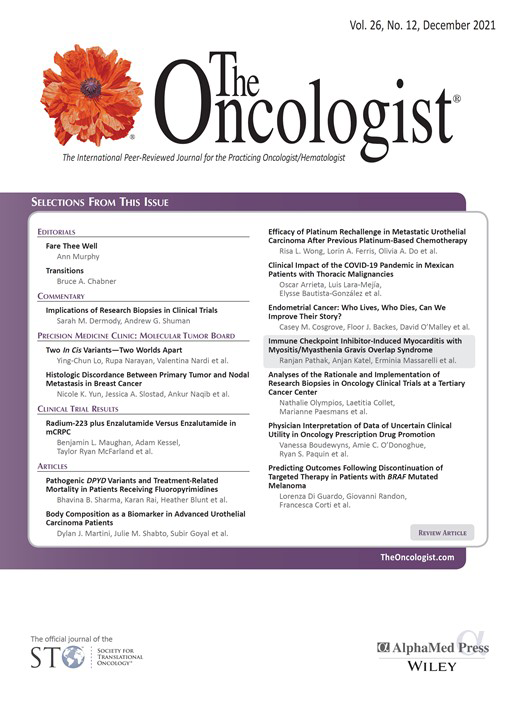摘要
背景介绍根据ENLIVEN III期试验显示的临床疗效,培沙替尼(Turalio)是美国食品药品管理局批准用于治疗腱鞘巨细胞瘤(TGCT)患者的唯一一种全身疗法。本研究评估了接受培西达替尼治疗的TGCT患者的纵向患者报告结果:在美国通过风险评估和缓解策略接受培昔达替尼治疗的成年患者中开展了一项纵向研究。对符合条件的患者(至少年满18岁,在基线调查前至少服用过一次培沙替尼,且在随访调查时仍在接受培沙替尼治疗,未参加过任何培沙替尼临床试验,能用英语完成问卷)进行了两次包含患者报告结果问卷的网络调查。第一次评估于2021年启动(基线),第二次评估于2022-2023年完成(随访):在完成基线评估的 83 名合格患者中,有 45 人符合随访条件。其中 31 人同意,28 人完成了评估。随访调查时,平均(范围)治疗时间为 18.5(10.6-36.2)个月,平均(标清)年龄为 41.9(13.70)岁,67.7% 的患者为女性。最常见的肿瘤部位是膝关节(67.7%)和踝关节(16.1%)。在随访中,超过85%的患者表示自开始接受培西达替尼治疗以来症状有所改善,近70%的患者表示症状 "非常改善 "或 "改善很多"。从基线评估到随访评估,患者报告的身体功能、疼痛和僵硬程度的变化没有统计学意义(P > .05):这项纵向研究的结果表明,在有症状的TGCT患者中,佩西达替尼持续使用一年后,从患者的角度来看,佩西达替尼在总体症状改善方面仍有益处。Background: Pexidartinib (Turalio) is the only systemic therapy approved by the United States Food and Drug Administration for the treatment of patients with tenosynovial giant cell tumors (TGCT ) based on clinical benefits demonstrated in the Phase III ENLIVEN trial. The present study assessed longitudinal patient-reported outcomes of patients treated with pexidartinib for TGCT.
Methods: A longitudinal study was conducted in adult patients who received pexidartinib via the Risk Evaluation and Mitigation Strategy in the United States. Two web-based surveys containing patient-reported outcome questionnaires were administered to eligible patients (at least 18 years of age, had taken at least 1 dose of pexidartinib before baseline survey and still on treatment with pexidartinib at the time of follow-up survey, had not participated in any clinical trials for pexidartinib, and could complete questionnaires in English). The first assessment was initiated in 2021 (baseline), and the second was completed in 2022-2023 (follow-up).
Results: Of 83 eligible patients who completed baseline assessment, 45 were eligible for follow-up. Thirty-one of whom consented and 28 completed the assessment. At the time of the follow-up survey, the mean (range) treatment duration was 18.5 (10.6-36.2) months, mean (SD) age was 41.9 (13.70) years, and 67.7% of the patients were female. The most common tumor sites were in the knee (67.7%) and ankle (16.1%). At follow-up, over 85% of patients reported symptom improvement since initiation of treatment with pexidartinib, and nearly 70% of patients reported symptoms to be "Very much improved" or "Much improved." From baseline to follow-up assessment, changes in patient-reported measures on physical function, pain, and stiffness were not statistically significant (P > .05).
Conclusions: Findings from this longitudinal study showed continued benefit of pexidartinib in overall symptom improvement from patients' perspectives after an additional year of continued use among patients with symptomatic TGCT.

 求助内容:
求助内容: 应助结果提醒方式:
应助结果提醒方式:


